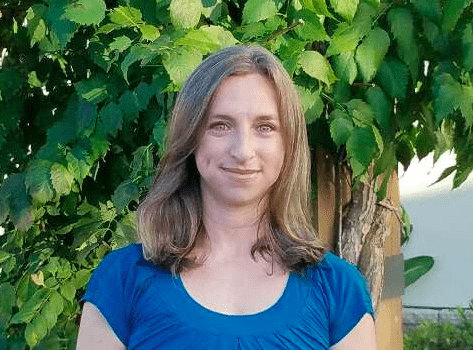
Episode 003: Joanna Grama–Leader and Influencer
Category:EDUCAUSE,Higher Education,Information Security,Introverted Leadership,Leadership,PodcastPodcast: Play in new window | Download
Subscribe: Spotify | Amazon Music | iHeartRadio | Podchaser | TuneIn | Deezer | RSS
Episode 003 Show Notes: Joanna Grama
Introduction
 Joanna Grama is a senior consultant for Vantage Technology Consulting Group where she specializes in advising clients on information security, privacy, and risk management issues. In our second discussion on the podcast, Joanna Grama and Ben Woelk discuss how meetings can be challenging for introverts, and how she’s become a leader and influencer.
Joanna Grama is a senior consultant for Vantage Technology Consulting Group where she specializes in advising clients on information security, privacy, and risk management issues. In our second discussion on the podcast, Joanna Grama and Ben Woelk discuss how meetings can be challenging for introverts, and how she’s become a leader and influencer.
- Twitter: @runforserenity
- LinkedIn: https://www.linkedin.com/in/joannagrama/
Key concepts
- Meetings
- The slow thinker
- Processing internally
- Win-win scenarios
- Connecting and investing
- The five Cs
- Don’t be a jerk!
Quotable
I’m just doing my job. I’m just trying to get through the day, and–and you know–leave as little drama as possible in my wake. But maybe that’s being a quiet leader.
We all have moments in the office or in our professional lives where we’re really not proud of our behavior, whether it’s the language we used, the tone we used, our facial expressions and our body language. I mean, we all have those moments, but it’s just, it’s really important to try not to be a jerk. That goes a long way towards getting along with people.
You have to challenge yourself everyday, and it sounds trite to say that, but if I didn’t have mentors pushing me and saying you’re great and you can be even better, and forcing me to do uncomfortable things, I wouldn’t be where I am today!
Resources or Products Mentioned in this Episode
- Vantage Technology Consulting Group
- EDUCAUSE Security Professionals Conference
- Exploding Kittens card game
- ECAR Research Bulletin, The Successful Security Awareness Professional: Foundational Skills and Continuing Education Strategies
- STC Intercom May/June 2018
Links
- Follow me on Twitter
- Like my page on Facebook
- Support me on Patreon
- Get swag for Hope for the Introvert and Introverted Leadership at Zazzle
Transcript
Ben: Joining us again is Joanna Grama. Today we’re going to finish up our conversation that we started in our last podcast about her experience as an introverted leader and the thoughts that she has to share with us.
Ben: So, one of the things that you and I had talked about in previous conversations is meetings. And I had–I’ve mentioned this in another podcast, but I had an individual in one of my workshops who talked about his meeting performance and, much like you said, somebody told you that you needed to overcome this anxiety about public speaking and do well at it. He had a situation where his manager said he needed to perform better in meetings, and I know what he did to solve it. He talked to his manager and arranged to meet with that manager ahead of time, so he’d have a preview of what was on the agenda and that helped him.
Ben: What has your experience been like with meetings as an introvert and what have you found has been helpful or maybe not helpful?
Joanna: Yeah. Meetings can be a really tough scenario for introverts even when you are 100 percent engaged in the meeting. So I–similar to the other person that you talked to–I had a supervisor once who commented in front of a group of my peers that I was a slow thinker in meetings. And it really sort of–and this sounds strange–but it really hurt my feelings. Not because it was true or it wasn’t true, because it is true, but because of the negative connotation that I associated with the comment. I am a slow thinker. I do like to think about issues and ru(minate) them over in my mind before deciding on a course of action or making plans or something. That’s just being thoughtful, and being that type of thoughtful cautious decider is something that is so ingrained in who I am as an attorney, as an information security professional, as a parent, as a person.
Joanna: But, on the other hand, there are times when, as a knowledge worker, you really do have to be able to react and provide feedback on the spot, but you don’t have to do it all the time. So with the supervisor that called me a slow thinker, we eventually came to an agreement that, for those items that we could put off for a day or two, I could come back to the table with comments after having time to think. And then for the items that had to be discussed and where feedback had to be provided right away, we agreed that I would provide those immediate comments and I would just get comfortable with it, but that we both understood that my best thinking always comes after reflection time, and so I could always provide additional feedback the next day, relatively contemporaneous with the urgency of the conversation if needed. And that seemed to be how we dealt with the situation in a way that worked for my supervisor and me, that worked for my peers, that worked for decision-making within the organization. I am really trying to come to terms with being a slow thinker, although I have amended that label to thoughtful and comprehensive thinker in my head.
Ben: I would say that is a little less negative way to address that. Slow thinker, I don’t think there’s a way to spin that positively.
Joanna: No. There’s just not.
Ben: Considered thinker, reflective thinker, well considered–all of that makes sense. And that’s all very positive, which could be spun in a negative way, I’m sure. But slow thinker? No, I don’t think there’s any way to take that positively, And it’s funny because I’ve used this conversation that we’ve had about this in workshops and other things to talk to people about–as an introvert, you may be accused of this, because we are thinking through things before we speak. We process internally. What’s interesting–and I think there have been a number of studies around this–in meetings, what typically happens if you have a mix of introverts and extroverts, is the extroverts will speak first because they will process externally and they will come up with an idea, and because they–it may have been the first idea or they’re very confident about the idea–people will say, “Oh yeah. We’ll do that.”
Ben: However, there doesn’t appear to be any correlation between who speaks first with an idea and positive results from it. So I definitely empathize with you on the slow thinker part in meetings, and I’ve come to the point where I can speak pretty quickly in response to things, but I will also tell whoever’s running the meeting if I’ve got–if it’s a really important subject–I want time to go away and dwell on that, so I can come back with a really superior solution that I can feel good about and that I’m convinced will work. There are too many thoughts that occur to me after the meeting about “Well, that would have been a real show stopper,” or “Have we considered adding this part?” and that could make something so much stronger, or a word I hate to use, robust.
Ben: Let’s change gears a little bit. Recently I did an article for Intercom magazine and it was about becoming an influencer and a leader in the workplace. How do you feel it works for you in the workplace? In terms of when you can be an influencer, when you can be a leader, what works best for you? Do you consider yourself to be an influencer or leader in the workplace? As somebody external, I certainly consider you to be one.
Joanna: Well, thank you. I’m always sort of surprised when someone says you’re a leader or an influencer. Not because I don’t think I can’t be a leader or an influencer, but sometimes I just think, how can I be a leader or an influencer? I’m just doing my job. I’m just trying to get through the day, and leave as little drama as possible in my wake. But, maybe that’s being a quiet leader. I don’t know. I love the process of building consensus and sort of negotiating, maybe not a win-win scenario, but a, you know, least destructive scenario or a scenario most of us can live with. I’m making sure I hit–I’m going to call it win-win–making sure I hit that win-win scenario’s important, which you probably have to find hilarious given both my training as an attorney and the merciless way I treated you during our last game of Exploding Kittens.
Joanna: I just really think that getting to a place where you and whomever you’re working with can move forward as a team is so important, and that goes back to making a connection and having an investment in your colleagues, having an investment in your organization, and that sort of thing. Some of it is, “Don’t be a jerk!” We all have moments in the office or in our professional lives where we’re really not proud of our behavior, whether it’s the language we used, the tone we used, our facial expressions, and our body language. I mean, we all have those moments, but it’s just, it’s really important to try not to be a jerk. That goes a long way towards getting along with people.
Ben: So, I can see we have our subtitle for this episode. It’s going to be, Don’t be a Jerk.
Joanna: Don’t be a jerk, yeah.
Ben: We’ll play with that a bit. I’m sure.
Ben: So, in terms of you being a leader and an influencer, some of the ways that I’ve seen that: one, I’ve had an opportunity to observe you over the last couple of years when I’ve been at conferences, and I’ve been part of these EDUCAUSE working groups where you’ve been kind of the program manager for them. What’s been interesting for me, I thought that was really helpful, as I think I’ve seen times where you’ve really kind of gone beyond what I would say is the call to duty. One example of that is a couple of years ago when I was working on putting together survey results about what are the best characteristics or preparation for somebody who’s going to be a security awareness practitioner, somebody who’s going to explain very technical security things to a “normal” audience. So I was struggling to get this research bulletin prepared, and I was about ready to give up on it, and I told you I was going to give up on it, and you didn’t let me do it. You pretty much shepherded me through it, you know, provided feedback. We went back and forth about, “Ah! I caught a typo,” which you were not thrilled with, but in general you helped me actually get that thing done. and I was quite happy with the result. But that being able to reach out and collaborate and help someone get the work done and complete it was really important. So, I’ve seen you as a leader and an influencer in that context as well.
Joanna: Oh, well, I’m really glad that you see me as a leader in that context and not as a nag! I think in that situation in particular, now that I’m looking back at it with hindsight, right? I have the opportunity to be eloquent. That paper was really important. We talk about how important information security training and awareness is to higher education institutions, to our organizations, but there’s not a lot of, or there wasn’t at that time, a lot of thought leadership on why it is important or what skills do the people who are actually doing that training, what do they need to have in order to be successful? Because, if those leaders aren’t successful, then information security awareness and training isn’t successful, which means data is at risk at our institutions, which can lead to all sorts of bad downstream things. So really, I was professionally motivated by the fact that I wanted this literature out there and you had the expertise and the data, so you needed to be the one to get it out there.
Joanna: And then, you know, personally, I knew you! I wanted you to have the success. It’s important to me to help my friends. I don’t know that I would call it going beyond the call of duty, as much as I would say it was getting to that win-win scenario where you got something out of it, I got something out of it. I really thought that the process was fun, once we sort of decided that we were going to regroup and work on it together–and those things are so important! It would have been too easy, Ben, to walk away from that, and I’m so glad we didn’t.
Ben: No, I agree. I think it was important. I’m actually fairly proud of the work and excited that it was published,…
Joanna: You should be!
Ben: and I hope it has provided a foundation for people when they’re looking at what are the qualifications someone needs or, just as importantly, what qualifications do they NOT need to be an information security or cyber security awareness practitioner.
Ben: What recommendations would you have for introverts who want to become influencers or leaders? What thoughts do you have for them?
Joanna: Sure. So I read a long time ago this article that talked about–I think it was called the four Cs or maybe the five Cs, but essentially it is, some big ideas for how to live your life. And so I like to follow the five Cs, which are Curiosity, Compassion, Courage, Conviction, and Conversation. I think that as an introverted leader or an introverted influencer,–just an introvert or a person trying not to be a jerk–those are some really good–those are some good ideas to have. You can’t be a doormat, but you can be compassionate and courageous. And I think that’s important for me. I sometimes add a sixth C, which is Calm, to remind myself when I need to take a break or to recharge and get reinvigorated about things. I have to remember not to let the external environment or the external context, impact my internal context.
Joanna: So that’s why I add Calm. And part of it is being true to yourself. I really struggled with who I was as a person and potentially a leader or a worker in an organization, or just anything, until I acknowledged some fundamental truths about myself. I need to recharge. I am a–what did you call it?–A conscientious thinker. I am shy and reserved almost to the point that people who don’t know me or are meeting me for the first time, might think I’m standoffish, and I have to do things to make sure that that’s not the impression that I leave people with. And just, those are important.
Ben: Do you have any other thoughts you’d like to share?
Joanna: You know what? You have to challenge yourself everyday, and it sounds trite to say that, but if I didn’t have mentors pushing me and saying you’re great and you can be even better, and forcing me to do uncomfortable things, I wouldn’t be where I am today! And I’m so thankful and grateful and happy with where I am today. A little bit of honoring yourself, and a little bit of stepping outside of your comfort zone is important.
Ben: That’s great. Well, I think we’ll wrap up now. Thank you so much for sharing your thoughts today. It’s been a fun conversation!
Joanna: A pleasure!
Ben: And we look forward to maybe having you join us again on another podcast. Assuming we can find a whole new set of things to talk about, which I’m sure we can.
Joanna: I’m sure we can!



 Sara Feldman is a content experience strategist at MindTouch. We discuss her role, and what it’s like for her as a leader and influencer in the workplace and as a leader of the STC San Diego community. Topics include how she recoups energy, planning ahead for carving out recovery time, pre-charging before a grueling stretch of interacting with others, meeting strategies, and how being a leader actually helps when attending networking events.
Sara Feldman is a content experience strategist at MindTouch. We discuss her role, and what it’s like for her as a leader and influencer in the workplace and as a leader of the STC San Diego community. Topics include how she recoups energy, planning ahead for carving out recovery time, pre-charging before a grueling stretch of interacting with others, meeting strategies, and how being a leader actually helps when attending networking events.









